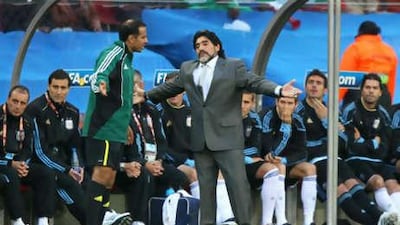Genius does not abide by the rules. If anything, it tries to rewrite them. Genius provides an escape clause, a short cut to salvation, an immunity against the demands others face, an idiosyncratic way of operating that lesser mortals cannot pursue. Genius can win a World Cup, single-handedly. Diego Armando Maradona is a footballing genius. With the ball at his left foot, he was as potent as any player in history. With it on his left hand, he was as audacious as any. But genius can blind its possessor to conventional wisdom. The Argentina manager has long believed in his own logic, regardless of whether it jars with anyone else's. Listening and learning have not tended to be his strong points.
This is not doing it by the book. Instinctive virtuosity and careful planning are not natural bedfellows. Nor do a pursuit of immortality and a belief in his own brilliance go hand in hand with the analytical prowess and man-management skills high-level coaching tends to require. Being a hero to a generation, if not a nation, gives him an automatic advantage, but he has to organise and galvanise the men who idolised him.
Thus far, Maradona has been both blood brother and Mr Motivator. With the unusual combination of a piratical beard and a supersized suit, the man was a magnet to cameras in Argentina's opening win over Nigeria. He will be again today against South Korea. Thus far, genius appears to have inspired genius. In everything bar the finish, Lionel Messi has finally replicated his Barcelona form for his country. A formation has been devised with Messi in mind; two strikers ahead of him to create space, three midfielders behind to supply the passes.
So far, so good. Assess the first round of matches and Maradona may come out with more credit than England's Fabio Capello or Dunga of Brazil, let alone Raymond Domenech, the France coach. Yet the unorthodox approach to selection - more than 100 players have been chosen in his brief reign - contains its perils. Juan Sebastian Veron, 35, appears Maradona's confidant. He starts because Juan Roman Riquelme, the playmaker who retired from international football after a dispute with the manager, is not in South Africa. Nor is Lucho Gonzalez, a classy catalyst in Marseille's title-win. Nor are Estebwan Cambiasso and Javier Zanetti, treble winners with Inter Milan.
In Zanetti's stead lurks the obvious weak link. Jonas Gutierrez, Newcastle's regular left winger, appears Argentina's first-choice right-back. It is the product of irrational faith. Nigeria, with a series of diagonal passes, exploited his uncertain positioning. It is a tactic that should have appeal for opponents. Indeed, full-backs in general, appear unappreciated by Maradona. Clemente Rodriguez is the only one in the squad. A pedestrian defence could be exposed.
At some stage, Maradona's tactics, his choices - such as that of Ariel Garce, a 30-year-old who has never played outside Argentina - or his combustible personality may result in another televised chastening, to accompany those of the 1982 and 1994 World Cups. Yet such is the nature of international football that a thought persists: what if it works? What if, whether because or in spite of Maradona, Argentina prevail?
They may have the most gifted group of footballers in the world and in Messi, the best forward. Individual talents win tournaments, as Maradona himself proved, let alone games. World Cups are not always rewards for consistency. They are won by teams who excel at pivotal moments. They only consist of seven matches; perhaps only four more wins or three good performances are required. What if, rather than completing the trilogy of 1982 and 1994, 2010 is the sequel to 1986, when Maradona inspired them to victory. What if Maradona's blend of genius and madness carries Argentina to glory? sports@thenational.ae
Maradona's World Cup career is a story of trophies, wonder goals, red cards and failed drugs tests SPAIN 1982 After missing the squad for the 1978 World Cup on home soil - a tournament Argentina won - a 21-year-old Maradona made his first appearance in 1982. Needing to beat Brazil, their great rivals, in the second group stage, Argentina were 3-0 down with five minutes left when Maradona lost his head and was sent off for kicking Joao Batista. MEXICO 1986 Four years later and Maradona found his redemption, captaining his side to the trophy and earning his place as a legend of the game. The midfielder played every game, scoring five and setting up five more. The topsy-turvy nature of his career was perhaps encapsulated in the 2-1 quarter-final win over England where he scored both goals, one with his hand and the other by dribbling past half the opposition defence. ITALY 1990 Trying to defend their trophy, Argentina rarely hit top form with Maradona, again captain, hindered by an ankle injury. They still managed to scrape their way to the final, beating old rivals Brazil along the way and then Yugoslavia and Italy (both on penalties). However, their luck from the spot ran out as Andreas Brehme netted a penalty five minutes from time in the final to give West Germany the trophy. USA 1994 Argentina's World Cup campaign was characterised by one iconic image. After scoring a cracking long-range effort in the 4-0 opening win over Greece, Maradona ran to a television camera, eyes bulging, grabbed hold of it and screamed in delight. Just days later he was expelled from the tournament after failing a drug test for ephedrine, a weight-loss supplement. His World Cup career was over.


